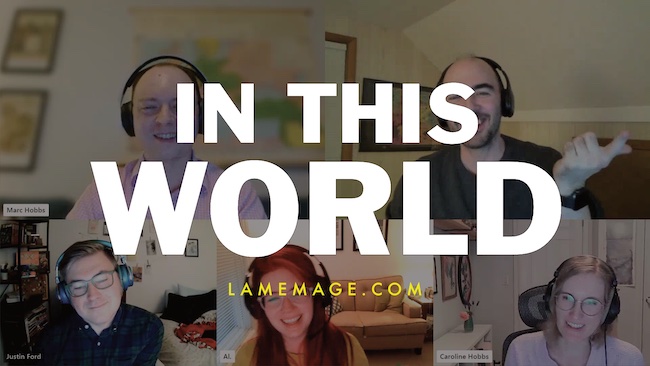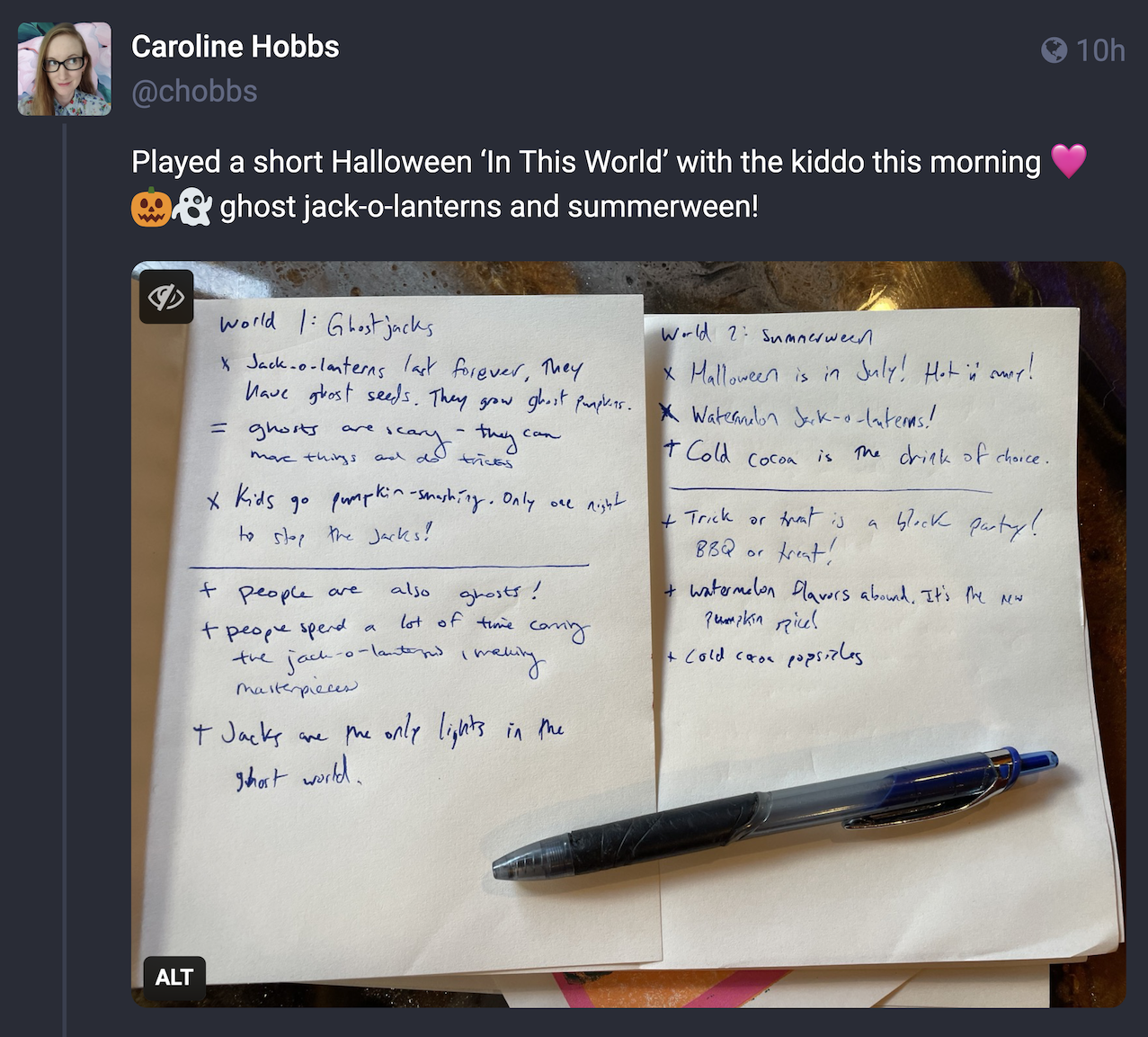
if you asked Ben's brain about gaming, this is what it would say
“Your female characters all sound alike” -the irony, oh the irony
I’ve mentioned before how, when I used to GM a lot, I had a tendency to keep secrets. Deep secrets. Long secrets. Sometimes for years. Longer than most people would consider sensible. Like back in the old Doven campaigns, it was almost ten years before anyone figured out the fundamental structure of the world.
When I buried secrets, I didn’t count on the players ever figuring them out. They were there because they were truths of the world, not … [ read more ]
Ben Robbins |
February 19th, 2024 |
GMcraft, grand experiments, new century city, what we played
| 1 comment
Like all boys, they never walked anywhere, but named a goal and lit for it, scissors and elbows. Nobody won. Nobody wanted to win. It was in their friendship they just wanted to run forever, shadow and shadow. Their hands slapped library door handles together, their chests broke track tapes together, their tennis shoes beat parallel pony tracks over lawns, trimmed bushes, squirreled trees, no one losing, both winning, thus saving their friendship for other times of loss.
Ray Bradbury, Something Wicked This Way Comes, 1962. We think of … [ read more ]
Ben Robbins |
February 15th, 2024 |
kudos
Does one of these belong to you?

If you interpret this glorious sight to mean that printing is done and shipping is underway, you would be correct.
Ben Robbins |
February 5th, 2024 |
In This World
“Let’s pick a light topic, like Holidays. Or maybe… MURRRRDEERRR????”
The Thursday night hobbits have a knack for In This World that is by now well-documented: sparrow bodhisattvas, mech wars, reimagining the Aliens movies… oh right, I never posted about the Aliens game. Someone remind me to do that.
So when we sat down to play our last game of the year, and folks said “hey, let’s imagine what the world would be like if MURDER followed totally different rules”, I had zero doubts it would be juicy.… [ read more ]
Ben Robbins |
January 18th, 2024 |
In This World, what we played
We’re playing a game of Downfall that has rapidly become my favorite. I was going to say it’s up there, but by now there is no question: this is the best Downfall game I’ve ever played.
But because I am a game scientist, complete with lab coat and goggles, I cannot leave well enough alone. I cannot simply say “hey, that was fun!” I must take the machine apart, gear by gear, and see what makes it tick so nicely. I must understand. I must know. And fortunately for me, … [ read more ]
Ben Robbins |
December 20th, 2023 |
Downfall, what we played
Over the past few years we’ve played some pretty huge Kingdom legacy games. Yes, the rules say you can make each new era in the past or future of your community, but on a whim I wondered just how often we actually played out of chronological order? Luckily I have all the data, so figuring that out is super easy…
As a baseline, this first charts shows what it would look like if we just kept playing in chronological order. Sessions are shown from left to right, with a longer … [ read more ]
Ben Robbins |
December 19th, 2023 |
K2, Kingdom, legacy kingdomon, legacy witches
I love when interviews stop being “interviews” and turn into conversations about the things we love. That’s exactly what happened during this chat with Craig Shipman on the Third Floor Wars podcast. A very fun time!
Third Floor Wars Podcast, Tabletop Talk with Ben Robbins
We cover a whole range of stuff, from when I started gaming as a kid, through the early days of story games, and then all the way up to new things like Microscope and In This World. Very “this is your life”.
Spoiler: the end … [ read more ]
Ben Robbins |
December 11th, 2023 |
80s gaming, audio, In This World, Microscope, talks & interviews
| 1 comment
“This is part of the magic of collaborative world-building — that you can start a sentence with no pressure to finish it on your own.
Jump. Your friends will catch you.”
Jack Edward wrote a very thoughtful review of In This World after playing it with his group to brainstorm a campaign world. I highly recommend it.
I really appreciate the honest reflections on the experience, both for Jack as the usual GM and the players that are hoping to play in this world later. Lots of good observations. There’s … [ read more ]
Ben Robbins |
December 3rd, 2023 |
In This World
We’re back at the table, playing more In This World. What could top our Vacations game? How about Dating..???

We recorded this game a while back, shortly after the Vacations session, but technical problems prevented me from editing and posting it when I first intended. Now that In This World is done, I circled back around to finish up and share it with you.
Marc, Caroline, Al and I were joined by Justin, who had never played In This World before. Which is perfect, because it reminded me to explain … [ read more ]
Ben Robbins |
November 30th, 2023 |
In This World, video, what we played
The full release of In This World is done! You can get it and play right now.

If you bought the early access release, you should have already received an email with your download link.
The book is about 20 pages longer than I originally planned, not because the rules changed — the rules are rock steady — but because I included more examples of play (at the wise suggestion of my backers) and also because I dug deep into the game theory mines to analyze exactly what goes on … [ read more ]
Ben Robbins |
November 26th, 2023 |
In This World
| 2 comments

You had me at watermelon jack-o-lanterns…
Ben Robbins |
October 30th, 2023 |
classrooms & kids, In This World, what we played
Twinkle Twinkle Little Bar…
Calamity Vault is a new podcast playing rare indie gems. Their first game? Kingdom! And they absolutely kill it with the ‘Lost In Luxury Space’ seed:
Calamity Vault: We Make Our Kingdom Together (episode 1 of 3)
One important caveat is that they played the old edition from 2013, not the more recent K2 from 2021. If you listen to their review in the third episode, you’ll see they had some difficulty with the rules, which totally makes sense, because the old text is… cumbersome. Which … [ read more ]
Ben Robbins |
October 24th, 2023 |
K2, Kingdom
I’m working on finishing In This World, but I keep thinking of more things I want to add. Just the other night we playtested an “alternate history” rules variant and now that absolutely has to go in the book. Plus there’s my usual perfectionist streak.
But the real thing slowing me down is… a mouse. A tiny frenemy, who has penetrated the perimeter and found a way into the innards of my house.
Tiny feet sneaking around the rafters is… distracting. Like Batman, it haunts the night. I merely … [ read more ]
Ben Robbins |
October 16th, 2023 |
In This World
| 1 comment
Plotbunny has translated Follow into German and the crowdfunding launch is underway right now!

Andrea Rick is managing the project, and I’ve been very impressed with her attention to detail and her desire to make sure the translation captures the experience of the original game.
It’s nearly half-funded, so if you’re a German-speaker who wants to bring some gaming goodness to your table, get in there!
Ben Robbins |
October 8th, 2023 |
Follow, translations
I was playing Sentinels with the usual crew, and my buddy was playing a character that could play a card to let them play a card to let them play a card, etc. Each turn took… forever. We might still be playing. I’m not sure.
The character wasn’t exactly overpowered, because each of those cards didn’t do a ton, but it took a long while to resolve even a moderately good hit.
I joked that, unlike video games, in tabletop games Damage Per Second (DPS) isn’t just a measure of … [ read more ]
Ben Robbins |
September 4th, 2023 |
game design, syndromes
| 1 comment












